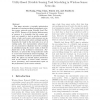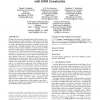163 search results - page 13 / 33 » How Optimal are Wireless Scheduling Protocols |
ICWN
2007
13 years 9 months ago
2007
This paper presents a tractable optimization strategies of sensing workload scheduling in wireless sensor networks using Divisible Load Theory (DLT). Because of the limited batter...
MOBIHOC
2007
ACM
14 years 8 months ago
2007
ACM
Recently, there has been substantial interest in the design of crosslayer protocols for wireless networks. These protocols optimize certain performance metric(s) of interest (e.g....
NETWORK
2006
13 years 8 months ago
2006
TCP, the dominant transport protocol for Internet applications, suffers severe performance degradation due to packet losses when a wireless link is present in the endto-end path. ...
CN
2006
13 years 8 months ago
2006
In this paper, we present MuSeQoR: a new multi-path routing protocol that tackles the twin issues of reliability (protection against failures of multiple paths) and security, whil...
WINET
2011
13 years 3 months ago
2011
Sleep scheduling, which is putting some sensor nodes into sleep mode without harming network functionality, is a common method to reduce energy consumption in dense wireless sensor...


